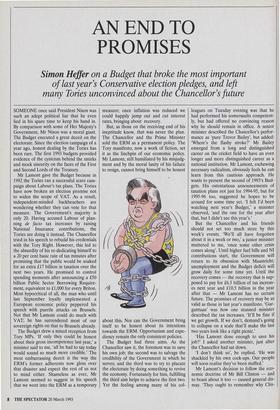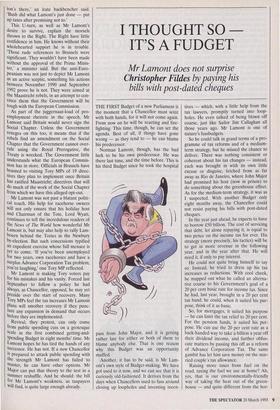AN END TO PROMISES
Simon Heifer on a Budget that broke the most important
of last year's Conservative election pledges, and left many Tories unconvinced about the Chancellor's future
SOMEONE once said President Nixon was such an adept political liar that he even lied in his spare time to keep his hand in. By comparison with some of Her Majesty's Government, Mr Nixon was a moral giant. The Budget executed a great deceit on the electorate. Since the election campaign of a year ago, honest dealing by the Tories has been rare. The first 1993 budgets provided evidence of the cynicism behind the smirks and mock sincerity on the faces of the First and Second Lords of the Treasury.
Mr Lamont gave the Budget because in 1992 the Tories ran a successful scare cam- paign about Labour's tax plans. The Tories have now broken an election promise not to widen the scope of VAT. As a result, independent-minded backbenchers are wondering whether they can vote for that measure. The Government's majority is only 20. Having accused Labour of plan- ning de facto tax increases by raising National Insurance contributions, the Tories are doing it instead. The Chancellor tried in his speech to rebuild his credentials with the Tory Right. However, this led to the absurdity of his re-dedicating himself to a 20 per cent basic rate of tax minutes after promising that the public would be soaked for an extra £17 billion in taxation over the next two years. He promised to control spending moments after announcing a £50 billion Public Sector Borrowing Require- ment, equivalent to £1,000 for every Briton. Most hypocritical of all, the man who until last September loyally implemented a European economic policy peppered his speech with puerile attacks on Brussels. Not that Mr Lamont could do much with VAT; he has surrendered most of our sovereign rights on that to Brussels already.
The Budget drew a mixed reception from Tory MPs. 'If only they could be honest about their gross incompetence last year,' a minister said to me, 'all he had to say today would sound so much more credible.' The most embarrassing deceit is the way the ERM's former adherents now gloss over that disaster and expect the rest of us not to mind either. Shameless as ever, Mr Lamont seemed to suggest in his speech that we went into the ERM as a temporary measure; once inflation was reduced we could happily jump out and cut interest rates, bringing about recovery.
But, as those on the receiving end of his ineptitude know, that was never the plan. The Chancellor and the Prime Minister sold the ERM as a permanent policy. The Tory manifesto, now a work of fiction, set it as the linchpin of our economic policy. Mr Lamont, still humiliated by his misjudg- ment and by the moral laxity of his failure to resign, cannot bring himself to be honest about this. Nor can the Government bring itself to be honest about its intentions towards the ERM. Opportunism and expe- diency remain the only consistent policies.
The Budget had three aims. As the Chancellor saw it, the foremost was to save his own job; the second was to salvage the credibility of the Government in which he serves; and the third was to try to placate the electorate by doing something to revive the economy. Fortunately for him, fulfilling the third aim helps to achieve the first two. Yet the feeling among many of his col- leagues on Tuesday evening was that he had performed his somersaults competent- ly, but had offered no convincing reason why he should remain in office. A senior minister described the Chancellor's perfor- mance as 'pure Trevor Bailey', but added: `Where's the flashy stroke?' Mr Bailey emerged from a long and distinguished career on the cricket field to have an even longer and more distinguished career as a national institution. Mr Lamont, eschewing necessary radicalism, obviously feels he can learn from this cautious approach. He wants to present the second of 1993's Bud- gets. His ostentatious announcements of taxation plans not just for 1994-95, but for 1995-96 too, suggested he hopes to be around for some time yet. `I felt I'd been watching next year's Budget,' a minister observed, 'and the one for the year after that, but I didn't see this year's.'
But the Chancellor and his friends should not set too much store by this week's events. 'We'll all have forgotten about it in a week or two,' a junior minister muttered to me, 'once some other crisis comes along'. Until higher fuel bills and NI contributions start, the Government will return to its obsession with Maastricht; unemployment and the Budget deficit will grow daily for some time yet. Until the recovery comes — the recovery that is sup- posed to pay for £6.5 billion of tax increas- es next year and £10.5 billion in the year after that — Mr Lamont has no certain future. The promises of recovery may be as valid as those in last year's manifesto. 'Gar- gantuan' was how one stunned minister described the tax increases. 'It'll be fine if we get growth. If we don't, demand's going to collapse on a scale that'll make the last two years look like a right picnic.'
`Has Lamont done enough to save his job?' I asked another minister, just after the Chancellor had sat down.
`I don't think so', he replied. 'He was shackled by his own cock-ups. Our people will soon realise they've been stuffed.'
Mr Lamont's decision to follow the eco- nomic doctrine of Mr Bill Clinton — and to boast about it too — caused general dis- may. 'They ought to remember why Clin- ton's there,' an irate backbencher said. `Bush did what Lamont's just done — put up taxes after promising not to.'
This U-turn, as well as Mr Lamont's desire to survive, explain the morsels thrown to the Right. The Right have little confidence in him. He knows without their wholehearted support he is in trouble. `Those rude references to Brussels were significant. They wouldn't have been made without the approval of the Prime Minis- ter,' a minister said. But the anti-Euro- peanism was not just to depict Mr Lamont as an active sceptic, something his actions between November 1990 and September 1992 prove he is not. They were aimed at the Maastricht rebels, in an attempt to con- vince them that the Government will be tough with the European Commission.
As part of the juggernaut-load of pro- employment rhetoric in the speech, Mr Lamont said Britain would never sign the Social Chapter. Unless the Government reneges on this too, it means that if the rebels find an amendment on the Social Chapter that the Government cannot over- rule using the Royal Prerogative, the Treaty is wrecked. The Government little understands what the European Commis- sion has in store. Officials in Brussels have boasted to visiting Tory MPs of 19 direc- tives they plan to implement once Britain has ratified Maastricht; directives that will do much of the work of the Social Chapter from which we have this alleged opt-out.
Mr Lamont was not past a blatant politi- cal touch. His help for racehorse owners will not only ensure that his holiday host and Chairman of the Tote, Lord Wyatt, continues to tell the incredulous readers of the News of The World how wonderful Mr Lamont is, but may also help to rally Lam- bourn behind the Tories in the Newbury by-election. But such concessions typified an expedient exercise whose full menace is yet to come. 'If you've been unemployed for two years, own racehorses and have a surplus Advance Corporation Tax problem, You're laughing,' one Tory MP reflected.
Mr Lamont is making Tory voters pay for his mistakes and his vanity. Forced last September to follow a policy he had always, as Chancellor, opposed, he may yet preside over the start of recovery. Many Tory MPs feel the tax increases Mr Lamont Plans will smother recovery if they punc- ture any expansion in demand that occurs before they are implemented.
Revival, they protest, can only come from public spending cuts on a grotesque scale in the first combined getting-and- spending Budget in eight months' time. Mr Lamont hopes he has tied the hands of any successor. He has not. If a new Chancellor Is prepared to attack public spending with the strength Mr Lamont has failed to muster, he can have other options. Mr Major can put that theory to the test in a summer reshuffle. And he should: the bill for Mr Lamont's weakness, as taxpayers will find, is quite large enough already.



























































 Previous page
Previous page